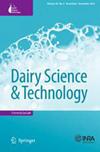Herd Routines and Veterinary Advice Related to Drying-Off and the Dry Period of Dairy Cows
Q2 Agricultural and Biological Sciences
引用次数: 0
Abstract
Bovine mastitis at calving or early lactation is often associated with intra-mammary bacterial infections (IMI) at drying-off (DO) or during the dry period (DP). The IMI risk is associated with management routines at the herd, but knowledge on how farmers and veterinarians comply with national recommendations is scarce, as is their attitudes to the importance of such routines. Therefore, the main aims of this study were to collect information on farmer routines and attitudes, and on veterinary advice and attitudes to DO and DP. Associations between routines and advice, and demographic herd and veterinary variables were also studied. Web-based questionnaires were sent to 2472 dairy farmers and 517 veterinarians. The answers were summarized descriptively, and associations with demographics were evaluated using univariable regression models. The response rate was 14% for farmers and 25% for veterinarians. Routines and advice were in line with recommendations at the time of the study in many, but not all, areas of questioning. Significant associations between herd routines or veterinary advice and demographic variables were also found. Milking system and post-graduate training were the variables associated with the largest number of farmer and veterinary answers, respectively. In conclusion, the results indicate a need for more education on good routines during DO and DP. It was also clear that the national recommendations valid at the time of the study were in need of revision.奶牛干乳期和干乳期的放牧习惯和兽医建议
产犊或哺乳期早期的牛乳腺炎通常与干乳期(DO)或干乳期(DP)的乳腺内细菌感染(IMI)有关。IMI风险与畜群的管理惯例有关,但农民和兽医如何遵守国家建议的知识很少,他们对这种惯例重要性的态度也很少。因此,本研究的主要目的是收集农民的日常行为和态度信息,以及兽医对DO和DP的建议和态度。还研究了常规和建议以及人口统计学畜群和兽医变量之间的关联。向2472名奶农和517名兽医发送了基于网络的问卷。对答案进行描述性总结,并使用单变量回归模型评估与人口统计学的关联。农民和兽医的回复率分别为14%和25%。在许多(但不是全部)问题领域,例行程序和建议与研究时的建议一致。此外,还发现畜群常规或兽医建议与人口统计学变量之间存在显著关联。挤奶系统和研究生培训分别是与农民和兽医回答最多的变量。综上所述,结果表明需要在DO和DP期间加强良好的日常教育。同样明显的是,在进行这项研究时有效的国家建议需要修订。
本文章由计算机程序翻译,如有差异,请以英文原文为准。
求助全文
约1分钟内获得全文
求助全文
来源期刊

Dairy Science & Technology
农林科学-食品科技
CiteScore
2.30
自引率
0.00%
发文量
0
审稿时长
2 months
期刊介绍:
Information not localized
 求助内容:
求助内容: 应助结果提醒方式:
应助结果提醒方式:


